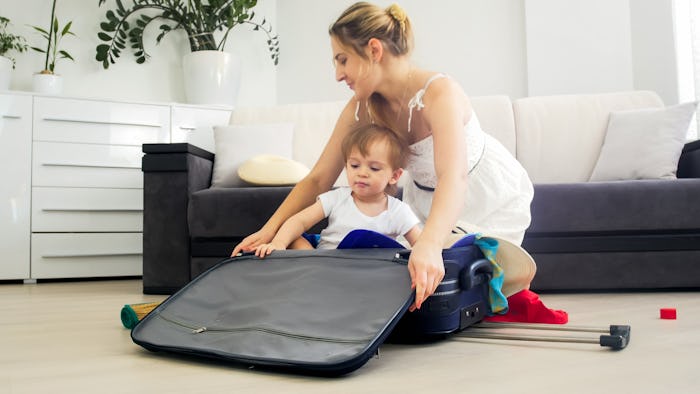Life

Here's A List Of Baby Supplies To Add To Your Hurricane Evacuation Kit
Here we are again. It's late summer and the Atlantic Ocean is hot enough to whip up its latest chain of hurricanes and tropical storms. Now that one million residents in North and South Carolina have been ordered to evacuate ahead of Hurricane Florence, parents are putting on their game faces to endure the trek away from home or to hunker down — hopefully removed from evacuation zones — in a safe place. But to assist them in their efforts to care for their little ones during this emergency, they'll need a hurricane evacuation kit list for babies, like one provided by The March of Dimes, to add to their storm supplies.
The Centers for Disease Control and Prevention advises parents to be prepared to leave quickly with your kit properly stocked. If you are going to a temporary shelter, it's important that staff know as soon as possible that you have an infant on the premises, the agency continued, and do not put off doctor's visits if you are displaced. Exams should be resumed as soon as it is safe to do so, even if you have to visit a different physician.
It's tough to pack for a baby, but it's even tougher to pack when you don't know what to expect ahead of a disaster. Some advice based on my own family's experience with Hurricane Irma last year? Double-up on safety items, even if you have a good supply on hand. Last summer, only a very few stores could open their doors because they had deep enough pockets to run a back-up generator, and the shelves were practically bare. It takes a beat for your community's infrastructure to get back online and you don't want to be caught with a sick baby who has finished up the last of her Tylenol or formula. If it's an essential item, take two and rest easy in the aftermath. If you don't know how to start the packing process, this list can help.
1Extra Bottled Water
So much water — all the water you can get your hands on. Potable water is often unavailable after the storm — even for showering — so grab a flat and fill 'er up. If your baby uses formula, think about the water you'll need for those bottles, too. FEMA recommends one gallon per day per person.
2Vitamins & Other Medications
Throw an extra bottle of infant Tylenol in the basket, just in case. Also, see if your doctor can write an extra script for prescriptions in case the disaster wipes out contact for awhile or, like in our case, they hop a flight to Europe and decide not to come back until everyone else sorts out the damage.
3Two Baby Blankets
Well, at least two. Good to have back-ups if your little one won't rest until they're swaddled.
4Thermometer
You're a good mom and are always prepared for a fever, so throw a thermometer on the pile.
5Copies of Vaccination Records
Very important if you can't go home for a while or your pediatrician's office sustains damage. Water damage is real and painful, friends.
6Antibacterial Wipes Or Hand Sanitizer
Remember, there probably isn't any potable water for hand washing.
7Dish Soap
Bottles and nipples will still have to be washed wherever you are, so grab a small bottle just in case.
8Portable Crib
Obviously this is needed if you're evacuating, but your house could become uninhabitable and the baby needs to sleep somewhere if you need to vacate.
9Baby Foods In Pouches & Jars
Since there will likely be no refrigeration for a bit, fresh purées are out of the question. A supply of pasteurized foods stored in aseptic containers will literally be a lifesaver.
10Disposable Spoons & Cups
Again, there's no running water or electricity. Use a dish once, throw it away, and save your drinking water for more important things, like brushing your teeth.
11Extra Baby Clothes
Since you would probably double your baby's clothing supply anyway, triple it for a hurricane kit because otherwise you might find yourself beating onesies on the rocks down by the river.
13Ready-To-Feed Formula In Single Servings
Easily the safest way to bottle-feed your baby when the basics are offline. Conserve your drinking water, right?
14Pedialyte
Kids get sick at the worst times. Truly.
15Ziploc Bags
Seal up a blowout and worry about it when the electricity comes back on.
16A Wrap, Carrier, Or Stroller
If you're not going to be able to drive for a while, or if you just need something other than your arms to transport baby in, grab your favorite carrier, wrap, or stroller so you can both get around. Also, it'll be helpful to have your hands free if you have to move quickly or if you need to find shelter.
17Identification For Baby & You
Things can get real weird, real quick, so be sure you can help officials easily identify that your child belongs to you.